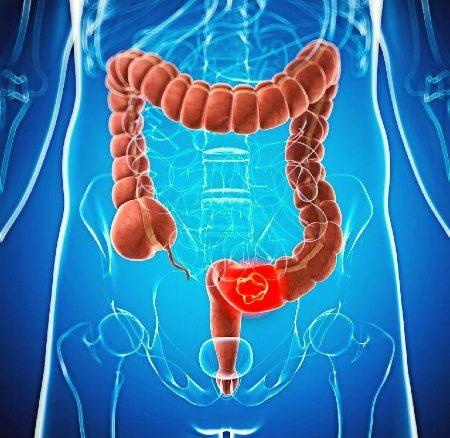
Contents [show]
Colon cancer is one of the most common malignant neoplastic diseases. In Israel, about 2,200 new cases of the disease are diagnosed each year. Colon cancer can occur in people of any age. It is most common in the age group of 50 to 70 years, almost equally in men and women.
How does colon cancer occur?
The large intestine is an organ located in the abdominal cavity. On it, the liquid feces transported from the small intestine. The liquid is absorbed and the formed feces are formed from the food slurry. Which subsequently ejected through the anus. Colon cancer develops from the mucous layer of cells.
A type of colon mucosa cancer – adenocarcinoma – develops slowly, over months or even years. The process of turning a healthy mucosa into a cancerous tumor only partially understood. During the development of the disease, the genes responsible for the control of the cell division of the rectal mucosa damaged. If violations occur in only one gene, then this does not lead to uncontrolled cell division (which results in the appearance of a cancerous tumor). But to local changes called “atypia”.
Read Also: Breast Cancer: Causes, Symptoms, Risks, and Treatment
Colon Cancer Diagnosis
Colon cancer can be diagnosed during a routine check at colon cancer screening in Los Angeles. Or when symptoms appear that prompts the patient to consult a doctor and undergo a diagnosis.
Symptoms in which the patient seeks help from a doctor associated with the development of a cancerous tumor. When the tumor grows, it partially overlaps the colon cavity. At the same time, bowel permeability for feces changes. That leads to changes in intestinal activity, a feeling of bloating, and abdominal pain.
Colonoscopy is the most preferred test for the diagnosis of colon cancer in other countries with a high level of medicine. This analysis performed by a gastroenterologist. Who inserts a flexible hose with an optical fiber through the anus into the colon. This analysis allows you to see the tumor, remove small polyps, or take a sample (biopsy) of the tumor to send it for pathological analysis.
Read Also: Could Medication give you Glaucoma?
Colon cancer treatment
There is no single cure for colon cancer. The treatment selected by the type of tumor. Its location in the colon, the stage of the disease and the general health of the patient.
Surgery is the main component of the treatment of colon cancer in most cases of the disease. The purpose of the operation is to remove the tumor and lymph nodes near it. If necessary, remove metastases.
Two main tasks that need to solve to determine the indications for surgery and the necessary preparations:
- To determine the extent of the spread of the disease. The doctor conducts a radiological examination (including CT and PET) of those places where metastases, including lungs, may appear.
- The assessment of the patient’s ability to survive the operation with minimal risk. Tests such as chest x-rays, ECGs, blood tests, and other tests. Including a heart examination, done to evaluate the risk associated with the operation and reduce it to the lowest possible level.
Colon surgery performed under general anesthesia, sometimes in combination with epidural anesthesia. The type of operation determined by the location of the tumor in the colon and the degree of its spread.
Read Also: Skin Cancer: Causes, Symptoms, Types, and Treatment
Types of colon surgery:
- right-sided colon resection (colectomy),
- extended right-sided colon resection,
- resection of the transverse colon,
- left-sided colon resection,
- removal of the sigmoid colon,
- subtotal colectomy,
- Total colectomy.
Clinic Observation
The purpose of observation in the clinic is to detect the recurrence of the disease as early as possible. Then we will be able to treat it as early as possible.
Observation will be carried out jointly in the oncology surgery clinic and the oncology clinic once every 4 months in the first year. After once every 6 months for the next five years. During each visit to the doctor, a blood test will be taken from the patient. Once every six months in the first two years, and then once a year – to do an abdominal MRI and chest x-ray. Colonoscopy must be done one year after the operation. Then continue to be done every two years.
Read Also: Best Foods that Prevent Cancer: Anti Cancer Foods




